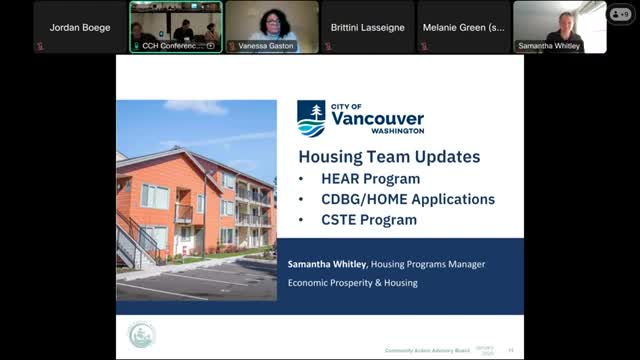Vancouver describes HEAR rebates, CDBG timeline and proposed construction sales-tax deferral
Get AI-powered insights, summaries, and transcripts
Subscribe
Summary
City of Vancouver staff briefed the CAB on a state-funded heat/energy appliance rebate program (HEAR) for low- and moderate-income households and businesses, the city’s 2025 CDBG cycle and a proposed sales-tax deferral/exemption for affordable housing developments.
City of Vancouver staff updated the advisory board on three housing- and energy-related items: a state-funded heating, energy and appliance rebate program (HEAR) for low- and moderate-income households and businesses inside Vancouver city limits; the city’s Community Development Block Grant (CDBG) 2025 application cycle; and a proposed local implementation of Washington’s construction-sales-tax deferral/exemption program for qualifying affordable housing developments.
Samantha (City of Vancouver) reported the city’s HEAR program is funded through Washington’s Climate Commitment Act and will provide tiered rebates to eligible households and small businesses inside city limits. The city’s allocation for the program is $1,480,000; the city partnered with the Northwest Native Chamber and the Hispanic Chamber for outreach. The city said the rebate will be tiered by income with some applicants eligible for a 100% rebate; the city’s partnering contractor would receive the rebate directly so homeowners and tenants would not have to pay up-front and wait for reimbursement. Staff said the program’s application materials and contractor-outreach were in final development and the city expects to spend funds by June (timeline may extend depending on uptake and Climate Commitment Act developments).
On federal funding, Samantha said the city has received full CDBG pre-applications, and the Housing Advisory Committee is reviewing complete applications with presentations to be scheduled next month; the city’s CDBG allocation has historically been about $1.4 million but the city also sets aside amounts for homeowner rehabilitation, repayment of a Section 108 loan for Fourth Plain Commons, and a $250,000/year capacity-building allocation to a community foundation for five years.
Samantha also summarized a construction-sales-tax deferral program the city is considering under a recent state law change that allows sales tax (state and local portions) to be deferred and, after 10 years, potentially exempted for qualifying affordable projects that meet affordability criteria. She gave a model example: on a $6 million development approximately $525,000 of sales tax could be deferred/exempted, with the majority of that amount coming from the state portion and smaller shares from city and county portions if the local jurisdiction opts in.
Why it matters: The HEAR program and CDBG awards provide direct energy and housing cost relief to lower-income households and small businesses; the sales-tax deferral could lower upfront costs for affordable housing construction and affect project feasibility.
Direct quote: “They’ll provide the rebate directly to the contractor so that the homeowner or the tenant wouldn't have to outlay that money first before getting the rebate,” Samantha said of the HEAR partnership structure.
What’s next: The city expects HEAR materials and sign-up tools to go live once contractor partnerships are finalized; the city’s Housing Advisory Committee will present CDBG recommendations to the city council (likely in April) for HUD submission in May; the sales-tax deferral ordinance will receive a public hearing before council next Monday.
